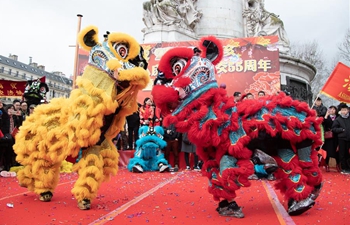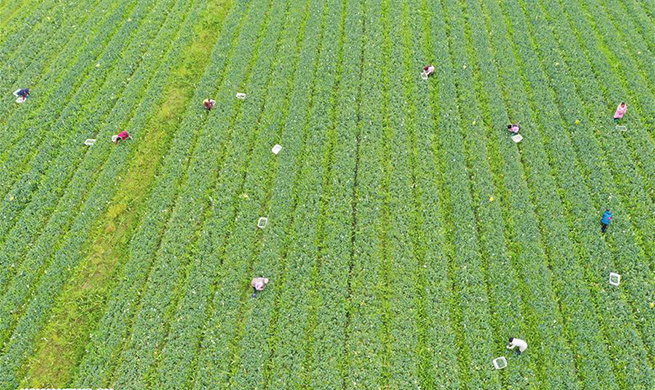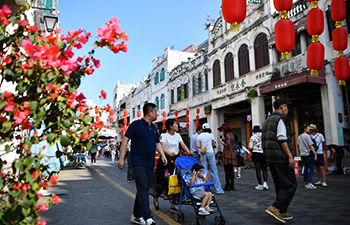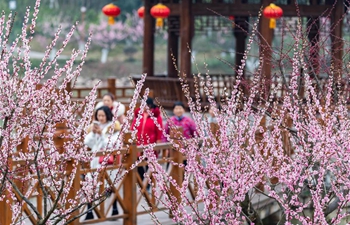BEIJING, Feb. 12 (Xinhua) -- For thousands of years the Chinese have been celebrating Spring Festival, or Chinese Lunar New Year. In recent times, the celebration has been more and more eco-friendly with a greater number of people becoming eco-conscious.
Saying no to wildlife products, eating well and cherishing food, wasting less, and choosing tour packages that do not encourage animal cruelty are becoming popular choices over the Spring Festival holiday, setting new trends for most important festivity of the year.
HOLIDAY EATS
On Chinese New Year's Eve, the family usually sits around the table to enjoy a large meal, but Song Keming, from Changyuan, a rural district located on the lower course of the Yellow River in central Henan Province, plans to patrol the vast wetlands until the morning sun rises -- just like every other day of the past 20 years.
Song and his team of 300 volunteers have been protecting migratory birds and wildlife on this wetland reserve against illegal poaching. When Spring Festival comes near, poachers become more reckless, applying poisoned baits, nets and traps to hunt anything to sell.
"I believe that every single one of us can make great contributions to the protection of the species and the biosphere by simply refusing to consume 'bushmeat,' wear fur or use any product with wildlife ingredients," Song said.
It has never been a tradition for the Chinese nation to take wildlife for food, said Hui Li, director of "Let Birds Fly," a non-profit volunteer group that has been collaborating with public departments to fight the poaching of migratory birds.
Festival eating is all about "eating well," she said. Back when the economy was less prosperous and per capita incomes were low, only those who could not afford meat would try capturing wild animals as a substitute.
"Nowadays no one starves so badly that they have to damage wildlife," she said. "And the rare minority of people who intend to show off their wealth or privilege by eating wildlife have been condemned and despised widely in China. Many have been arrested and such a minority is likely to be even more marginalized."
Ahead of the holiday season, the group launched a series of posters that feature China's endangered bird species, calling on the public to better know them by their ecological function and value, not as food sources, and warning of the sanitary risks of eating them as well as the severe legal consequences of poaching.
The posters under the slogan "Don't Eat Me!" have gained many "Likes" on China's social media.
On Feb. 3, many in Beijing attended the last gathering of a Farmers' Market before the holiday. Wang Xin, a farmer from Xiqing Farm said that for more and more Chinese consumers, eating well means enjoying foods that are safe, healthy and eco-friendly.
To eat well also means to cherish the food and not waste it, suggests a new campaign by the World Wildlife Fund (WWF).
Through the program named "Save 1/3," the WWF urges people to rethink the way food is produced and how to save the one-third that is wasted during production.
In China, much progress has been observed. For example, extravagance in collective meals has diminished, and it is more common for consumers to finish everything on their plate or to take away the leftover, said Jin Zhonghao, program director with WWF China.
"Celebrating zero-waste, treasuring food and having an eco-friendly Spring Festival is a wish shared by all of us," he said. To create a new national tradition of celebrating the Spring Festival with no food waste is "worthwhile and very probable."
HOLIDAY FUN
Three days before the lunar new year, Huang Zhige, 3, emptied his piggy bank and donated his entire fortune to "Long Legs," a female dog rescued by animal welfare activists from an illegal meat truck in Nanning, Guangxi Zhuang Autonomous Region in south China.
Knowing that he could help pay for the dog's medical treatment, food and shelter, the boy said this meant a lot more than buying candy or new toys.
He received a certificate from "Nanning Adoption Day" as the sponsor of Long Legs. "This is my Spring Festival present!" he said.
Like Huang, many Chinese families are choosing to do something "meaningful" to start the new year.
In Qingdao, in eastern Shandong Province, more than 150 families living in the Zhengzhou Road Community have been learning how to make organic fertilizer from kitchen waste.
The fertilizer is used in their gardens to reduce the amount of trash that goes to landfill or the ocean, said Xu Jin, director of the "You and I Creative Charity Center," a platform for local social workers that promotes zero-waste, recycling and sustainable lifestyles.
On Feb. 1, a second-hand bazaar was organized by the center in the coastal city, where people exchange, sell or purchase used items that are in good condition.
"Instead of throwing out things that are no longer in use, finding another home for them to be useful again is also a positive way to reduce waste," Xu said.
For many Chinese families or individuals that plan to travel abroad, the latest trend is to be an eco-conscious adventurer who says "No" to activities that cause animal abuse or wildlife damage.
In late January, 54traveler, a Shanghai-based travel agency, became the newest member of a "Wildlife-friendly Tourism" convention proposed by the World Animal Protection (WAP), a non-profit organization.
"We who love traveling are blessed to get to know the world, and the more we know, the more we come to realize that the world is an interdependent whole," said Fu Wenxian, founder of 54traveler.
Animal abusive activities such as riding elephants, taking photos next to tamed, toothless tigers or watching dolphins or orca do tricks are excluded from the travel agency's program.
The convention has 300-strong signatories from across the world, who promise not to provide any activities or services that might be based on animal performance or harm wildlife or the environment.
A joint study by WAP and Oxford University lists 10 tourist attractions as constituting major cruelty to wildlife, including visiting bear parks in Japan and holding sea turtles at a popular turtle center on the Cayman Islands.
"Better Blue", a group of Chinese scuba divers, has also proposed eco-conscious principles for outbound tourists not to touch or feed any creature on the seabed, not to use toiletries that contain micro plastic particles or chemicals harmful to coral and marine life. The divers are also encouraged to take part in local efforts to clean up the ocean.
Earlier this year, China's customs and National Administration of Forestry and Grasslands campaigned with the WWF and WildAid to alert tourists in neighboring countries not to buy ivory, not even as souvenirs.
A WAP survey shows that 85 percent of young tourists, who have become the major driving force of tourism worldwide, oppose activities that harm animals.
"Among Chinese consumers, especially the younger generations, an inspiring tendency is that more and more people -- usually those with higher educational backgrounds and better income levels -- are opting for eco-friendly and wildlife-friendly tourism," Yuan Xi, with China Cetaceans Protection Alliance, told Xinhua.

















